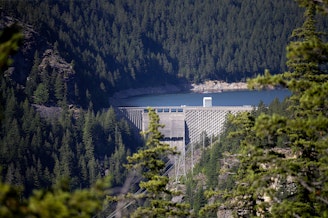‘Troublemakers’ win the day, but questions remain after Amazon drops pipeline plans

Amazon has withdrawn plans to buy natural gas from a proposed pipeline expansion in Oregon. Climate activists and some of the company’s own employees say that’s great news, but they also have questions.
Three months ago at Amazon headquarters in Seattle, a group calling themselves "Troublemakers" blocked the entrances at the start of the workday. They held signs protesting Amazon’s plans to rely on TC Energy’s Gas Transmission Northwest (GTN) XPress pipeline expansion to power its data centers in Oregon.
Protesters said they were focused on the perils of climate change, and that relying on more fossil fuels was at odds with Amazon’s own climate pledge to reach net-zero carbon emissions by 2040. Now Amazon appears to be granting their request.
RELATED: Trees and contaminated soil are removed following gas pipeline spill in Skagit County
Troublemakers spokesperson Emily Johnston said she’s thrilled to hear that Amazon has changed course on the pipeline.
“It’s very important that we not invest money or infrastructure in new fossil fuel, so it’s terrific that Amazon has backed away from this project,” she said. OregonLive reported Tuesday that Amazon had withdrawn its application.
Sponsored
Johnston said she’s hoping reduced demand will prevent the pipeline expansion from going forward. In a recent court filing, the pipeline owners raised doubts about the project’s financial viability. But Johnston said if Amazon keeps using other fossil fuel sources to power its data centers, then the move is less significant.
RELATED: Amazon's rise to the top explained in 'The Everything War'
Amazon did not say why it cancelled its plans. In a statement, a spokesperson for Amazon Web Services (AWS) said, “At this time, we are not continuing with fuel cell projects in our Oregon operations. We are engaging thoughtfully with Oregon policymakers, environmental advocates, and the energy sector to meet our shared goal of clean, carbon-free energy that can scale to meet the needs of families, businesses, and other constituents in Oregon.”
It added that AWS “is working to add more renewable energy in Oregon,” noting it reached a deal to purchase some wind energy earlier this year. “We expect the clean energy enabled by our investment in 'Amazon Wind Farm Oregon – Leaning Juniper' to start being delivered by next year,” an Amazon spokesperson said.
KUOW heard from Amazon employees who supported the company’s decision but want even more significant steps to reduce carbon emissions linked to record heat waves and wildfires.
Sponsored
RELATED: Microsoft’s carbon emissions surge despite goal of becoming ‘carbon negative’ by 2030
An Amazon software engineer based in Seattle who is a member of Amazon Employees for Climate Justice told KUOW, “I’m glad to see that Amazon is dropping its terrible plan to power Oregon data centers with fracked gas fuel cells. Amazon has to stop building out these massive data centers that are dependent on dirty energy, especially as it’s expanding so much in the AI boom.”
The employee added, “At least now in Oregon, Amazon is walking away from more fracked gas, and we employees want to see a true commitment to data centers being powered directly by renewable energy.”
Another current Amazon employee said, “I'm wondering if they just received enough pushback that they had to scrap the plan, but decided to not mention that part and instead let people assume that it was their own ‘climate-concerned’ choice. It could also be an effort to boost their positive ‘Climate PR’ ahead of releasing their yearly sustainability report sometime this summer.”
Both employees spoke to KUOW on the condition that their names not be made public because they fear repercussions with their employment.
Sponsored
After Amazon’s 2019 climate pledge, the company documented a nearly 40% increase in emissions by 2021. Emissions then declined slightly in the company’s 2022 report, by 0.4%.




